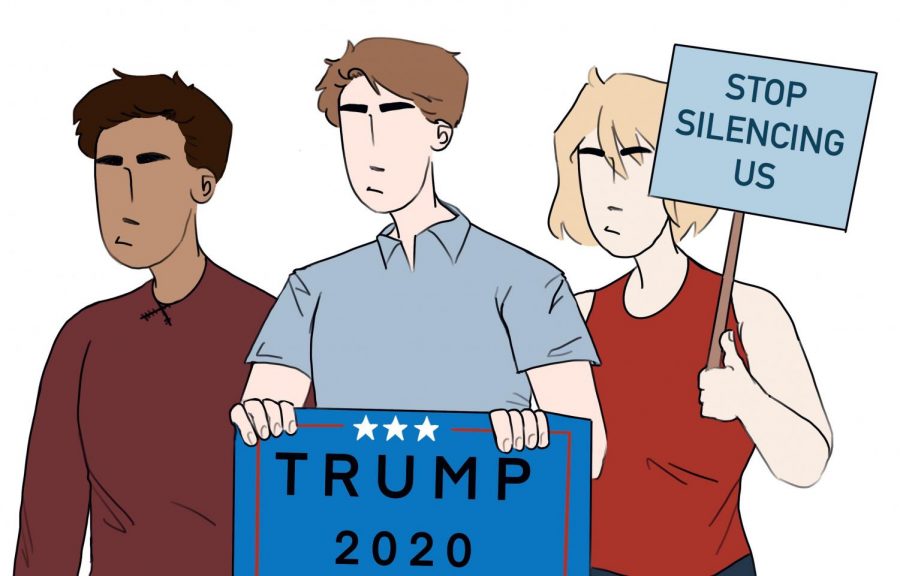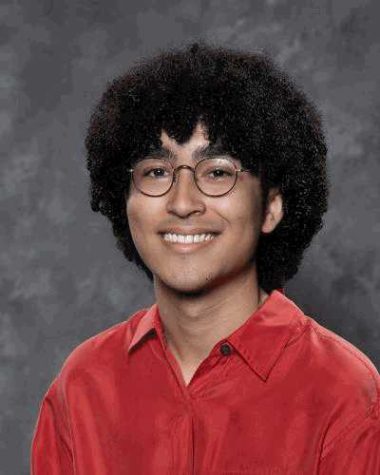Silent or Silenced: Viewpoints of Conservatives on Campus
Conservative students discuss whether or not they’ve felt silenced during political discussions on campus.
After participating in a political debate during a Community Flex Time earlier this school year, Liam Sullivan ’23 found himself connecting with his teachers because of his conservatism rather than being targeted for it.
March 24, 2021
During the 2020 Presidential Election cycle, Bryan* ’21 frequently found several of his classes discussing politics. However, Bryan knew that introducing his conservative opinions on issues such as healthcare, gun control and COVID-19 to the classroom would wreak havoc: arguments, discourse and teachers shutting down his “wrong opinions.” At times, Bryan said he felt the school’s atmosphere can be so anti-conservative that, for many students with conservative beliefs like his, it’s best to keep quiet to be treated well.
“Unfortunately, there are certain classes where the teacher is having an open conversation about something politics-related, but I cannot share my own opinion without the risk of my grade being harmed or my teacher thinking less of me,” Bryan said.
Similar to Bryan, conservative student Steven* ’23 said he is frustrated by anti-conservative rhetoric from teachers and hostility to conservative viewpoints in the classroom.
“I’ve sat through countless classes in which teachers have ranted [about] political issues such as their hate for [Trump], citing half truths and in some cases outright lies to defend their position while [students] are forced to listen to it with no objection,” Steven said in an email. “Sometimes my teachers will even say things about conservatives which apply to me, whether knowingly or not, which can be anywhere from mildly offensive to outright infuriating.”
Unlike Bryan and Steven, conservative student Liam Sullivan ’21 said he has had positive experiences with teachers because of his conservative views. After participating in a political debate during a Community Flex Time earlier this school year, Sullivan found himself connecting with his teachers because of his conservatism rather than being targeted for it.
“My teachers have actually told me that they respected the fact that I was public about my views in the political debate and now appreciate more than ever getting a different opinion on various political issues,” Sullivan said.
Although Sullivan’s teachers have been accepting of his political views, he said he understood why conservatives might feel uncomfortable sharing their beliefs with their own.
“Los Angeles is already predominantly left-leaning, and when teachers are espousing left-wing views, as is commonplace at school, it is extremely hard to propose a different viewpoint,” Sullivan said. “Those on the right, who are in the political minority at school, fear that the teachers will disapprove of your differing views and lower your grade.”
Sullivan proposed that keeping teachers’ political opinions outside of in-class political discussions would be beneficial to helping conservative students feel safer expressing their political views during class.
Although Sullivan, Bryan and Steven had varying experiences with teachers surrounding their political views, they felt liberal students’ reception of conservatives has been negative.
Bryan’s relationships with some of his liberal peers have been prone to conflict, and he feels unfairly judged by them.
“There is a minority of students that I have never spoken to [who] dislike me for the sole fact that I am conservative,” Bryan said. “Certain people have ostracized me for being a ‘racist Trump supporter,’ when in reality I am neither one of those things.”
While Steven furthered this notion and blamed anti-Republican radical leftists for mischaracterizing conservatives in the community, he also said he felt strongly that the school itself is anti-conservative and pushing a liberal agenda.
“HW more often than not simply tries to sway conservatives into more liberal positions with things like assembly speakers, class material, teachers and their beliefs themselves, and assignments given out to students,” Steven said.
Steven particularly felt frustrated at the lack of conservative speakers at Community Flex Time, citing police brutality as an example of a topic he wished the school provided conservative perspectives on.
“While more notable incidents such as the death of George Floyd have been condemned across the board, other more debatably justified police shootings have been carelessly grouped together with that of George Floyd,” Steven said. “While the opinion of people who believe these shootings were unjustified are of course valid, a concept I maintain despite my heavy disagreement with these positions, the lack of representation of any other opinion on these issues speaks volumes.”
Head of Upper School Beth Slattery addressed Steven’s concerns about the reception of conservatives on campus and said she understood them, but she also warned that these fears can be harmful.
“I recognize that there are conservative voices who don’t feel comfortable expressing their opinion, but I would hope to reassure people that the school isn’t interested in punishing people for expressing a conservative viewpoint.” Slattery said. “This unfounded fear of retribution leads people to lob anonymous charges through venues like @wokeathw, many of which are completely decontextualized and fundamentally misrepresent the school as a whole and some of my colleagues in particular. I also think these anonymous charges do a disservice to conservatives because they cause unfair generalizations that all conservatives think the same way.”
To foster positive discussion across the political divide, the school recently brought in two more political speakers: conservative Margaret Hoover and centrist John Avlon. The couple spoke at the Community Flex Time Wednesday, Feb. 3, 2021 and discussed political polarization and ways to repair it.
Hoover and Avlon heavily emphasized being empathetic to others, especially those with different political beliefs, to accomplish political unity. Steven appreciated and concurred with the speakers, specifically regarding the concept of disagreeing agreeably, which he wishes was more popular within the school community.
“The opinions shared were very interesting to me as it showed me something sparsely seen within the HW community, that being respectful disagreement,” Steven said. “It was also interesting that [the school] brought in a conservative as that in the past has immensely gone against the grain and is rarely seen.”
Sullivan said he concurred with Hoover and Avlon’s sentiment about showing compassion to those across the political aisle as crucial to repairing the state of modern politics. Sullivan said he would like his classmates to understand conservative viewpoints instead of outright disapproving of them without further discussion.
“If we have more compassion and empathy in our discussions about politics, like in the debate, we can genuinely progress and move forward as a community and as a country,” Sullivan said. “Our fellow Americans and those with different political opinions are not the problem.”
* Name has been changed
































